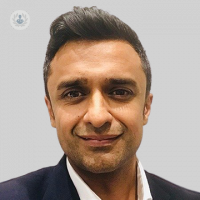What causes jaundice in babies and adults?
Written by:Jaundice is the yellow discoloration of the skin and whites of the eyes. It is one of the most common conditions that can affect newborns with an estimated 6 out of every 10 babies developing it. But, it´s not just babies that can develop jaundice, adults can develop it too, however it is rarer. Dr Deepak Joshi, a leading hepatologist in London, explains to us the different causes in babies and adults and how they can be treated.

What are the causes for jaundice in babies?
Some babies are born jaundiced and this is a normal physiological occurrence in the first 48-72 hours. Jaundice happens when the chemical, bilirubin, builds up in the baby’s blood. This happens during pregnancy where normally, the mother’s liver is able to remove bilirubin for the baby. After birth, the baby’s liver must remove the bilirubin on its own. Sometimes, the liver might not be developed well enough to get rid of the bilirubin. This causes too much bilirubin to build-up in a new baby’s body which results in the skin and whites of the eyes to appear yellowish. If this is the case, where jaundice is prolonged in a baby, then specialist paediatric advice is recommended.
And how about in adults?
The same can happen in adults, where bilirubin builds up in the body. The chemical is found in red blood cells and when those cells die the liver is supposed to filter it out. When your liver can’t do this, jaundice sets in. This may indicate that there’s something wrong.
The common causes in adults are related to the liver and the bile ducts. Hepatitis, which affects the liver, is caused either by a virus, type of medications or autoimmune disorders. When these are prolonged, they can damage the liver and cause jaundice.
Biliary causes, which are related to the bile ducts, can be divided into obstructive and non-obstructive causes. Obstructive causes indicate there’s a blockage of the bile duct which could be caused by gall stones or various forms of cancer of the bile duct. Non-obstructive biliary causes are related to diseases of the bile duct itself. These include, primary biliary cholangitis and primary sclerosing cholangitis – two types of liver disease.
What are the symptoms?
The most common symptom is itchy skin, followed by weight loss. Other symptoms include lethargy, poor appetite, fever and abdominal pain.
How do you treat jaundice?
Treatment is directed towards the underlying cause. If there is a blockage in the bile duct then placing a stent (plastic tube) across the blockage in the bile duct is the best procedure. Antibiotics are sometimes required if there is an infection in the bile duct. Treating symptoms such as itchy skin can be controlled through medications such as antihistamines. As for the weight loss, when one is jaundiced, the body is in a ‘negative calorie state’ and therefore, nutritional support is very important.
If you are suffering from the symptoms described here, or you’re worried about your liver health, book an appointment with Dr Joshi.


